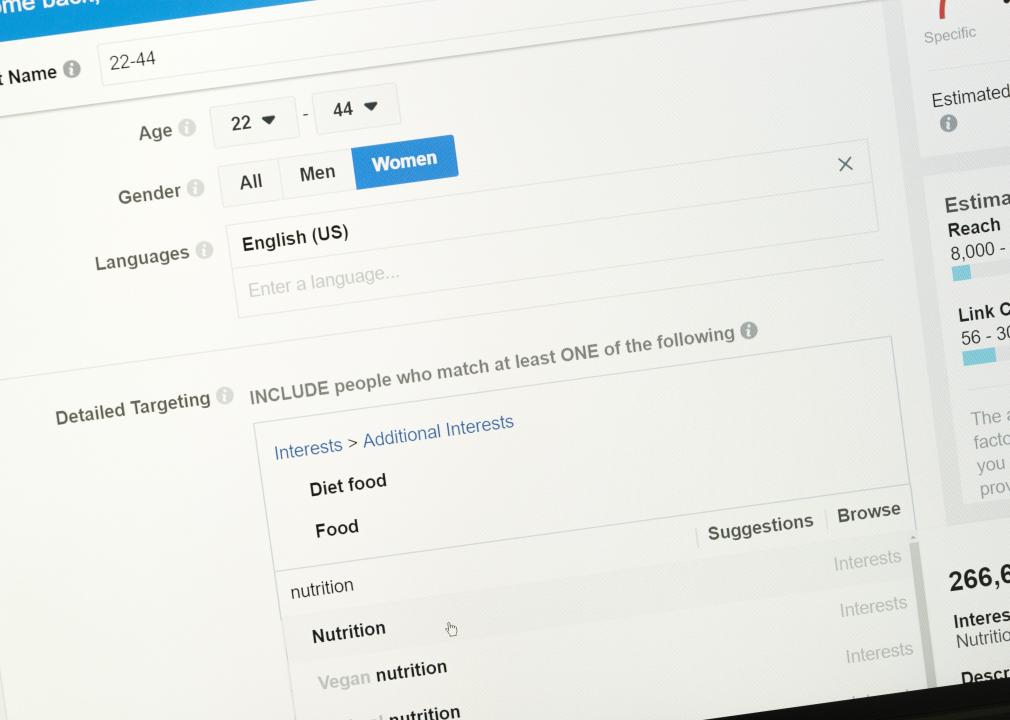15 ways we give social media companies personal data
everything possible // Shutterstock
15 ways we give social media companies personal data
In 2021, many internet users are savvier than ever about what they share or don’t share, but modern life almost requires engaging with social media in some way. How is personal data given to these sites, and how can that be utilized against users? To find the answer, Stacker compiled a list of 15 ways data is revealed to social media companies. This includes information from sites like the Electronic Frontier Foundation and Norton, as well as news reports from Buzzfeed and more. What these insights show is that everything done online—from what is clicked on to how long a page is looked at—is valuable to people who are selling that data.
Protecting privacy online is an ongoing challenge, and the goal posts are constantly moving as marketers grow more and more proficient in avoiding the obvious things consumers are aware of when visiting sites. That includes going past explicit location data, for example, and gathering up location footprints by using the things around users instead. It also includes setting up bots that scrub publicly available information to build profiles of users as potential customers. Any free service or app used is turned into a profile that can be sold to someone, whether directly or through customized advertising.
Read on for some of the most common ways that social networking companies gather and sell users’ data to the highest bidder. The only way to completely opt out of this system is to stop using almost everything that relies on the internet, which some people can manage to do. But for the rest of us, simply being aware of how our data is being bought and sold can show us ways to keep that data to ourselves as much as possible. Forewarned is forearmed.
You may also like: The best streaming services in 2021
![]()
Tero Vesalainen // Shutterstock
Personal data for the taking
Broadly speaking, any website that is free to use is selling your participation as its product. That includes personal data such as names, birthdates, locations, IP addresses, gender, and device IDs, as well as more abstract info such as hobbies and interests.
sitthiphong // Shutterstock
What gets you engaged sells
How you use free social media websites gives their makers a great deal of data about what is working and what isn’t, and they can sell that data as “consultants” on other products and websites. This includes which wording gets you to interact with a sponsored post on a social media page, for example.
13_Phunkod // Shutterstock
Giving them attitude data
Websites measure your “attitude” on issues. For example, you may have seen what seems like innocent poll questions used to paywall newspaper stories. If you take the time to answer any questions, that information, which could include how you feel about social and political issues, is hugely valuable to advertisers and marketers.
Gorodenkoff // Shutterstock
Behavioral data easily collected
Behavioral data is related to engagement and includes how you physically interact with social media websites, tracking everything from how your mouse pointer moves around the page to which of two versions of a new website design you spend more time visiting. This helps site creators develop new features that they believe you will use more.
fizkes // Shutterstock
What makes you stick around
Behavioral and engagement data helps social media sites make you stick around longer, which is the best way to ensure you see more ads. This is why, for example, websites have leaned on controversial or even dishonest content. It can attract more attention and create more conflict.
pixinoo // Shutterstock
You’re the bull’s-eye
With a full portfolio of data on you, websites like Facebook and YouTube can tailor-make ads that will come directly to you. These ads will relate to your interests, your search history, and even your location. You are the one being personally targeted in these endeavors.
chainarong06 // Shutterstock
Location, location, location
When using social media sites, your location is an especially nefarious share, because simply disabling location sharing on your part does not rule out other ways to know your whereabouts. It’s hard to guarantee you aren’t revealing parts of your location, especially if you use public Wi-Fi networks.
eranicle // Shutterstock
How you interact is telling
Companies want to know and buy data about your interaction patterns with customer service, for example, or user support on social media sites. By tracking how you use these and other services, sites can help companies better prepare marketing that will work on you.
simona pilolla 2 // Shutterstock
User surveys steer sites to you
Social media sites often offer “user survey” options that give them a straightforward way to take people’s time for free. They couch this as a way to improve your user experience, but again, it simply means if you take the surveys, you are providing them with more information to make you a better product for them to sell to marketers.
Konstantin Savusia // Shutterstock
Making money from third-party software
Mobile apps often include third-party software called software development kits (SDKs), which is sort of like planting a listening bug in someone’s home or office. Marketers pay to place these data-mining pieces of code in apps, making it hard for developers to say no—if they even want to. Free apps are just like free websites, meaning your information is how they will make money.
akids.photo.graphy // Shutterstock
You’re being triangulated
Apps can use secondary information to triangulate you, including hardware information like the MAC address of a printer you may use, for example. If you limit these interactions or use only private Wi-Fi networks, you can avoid some of this.
You may also like: The best streaming services for sports in 2021
chainarong06 // Shutterstock
Letting social networks use your photos
For social networks to work, they need certain rights over your photos and content because they’re effectively repackaging them to display with advertisements to your friends. The user agreements you check mark without thinking about it include the releases needed for these social media companies to use your photos and content—royalty-free.
PixieMe // Shutterstock
Oversharing details
While there is a focus on more secretive data mining, many users of social media volunteer quite a bit of personal data that is unwise to share in that context. This includes info that can be scrubbed by people working on behalf of employers or even cybercriminals, with no specific marketing goals involved at all.
Michael Candelori // Shutterstock
Check your settings
One of the easiest ways people inadvertently reveal information is by not looking closely at their settings. Social media sells usage either way, but leaving information truly public opens it up to third parties who skim these details for totally different kinds of uses.
GaudiLab // Shutterstock
Letting yourself be grouped
Giving sites a comprehensive and invasive personal view of your life, interactions, and behaviors online means they can easily group and sell you as part of a demographic. One way to at least avoid seeing this in action is to turn off Google ad personalization, for starters.
You may also like: How Americans feel about 30 major issues
















